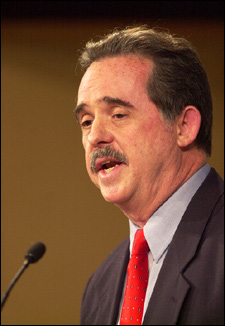Harvard students build bridges to development success stories:
Student-arranged conference hosts developing world community leaders

Around the world toil remarkable people whose unique skills and extraordinary enthusiasm put them at the center of difficult challenges. They bring people together who need to meet, create organizations where none existed, and are sometimes the lone force behind the search for solutions to daunting social problems.
Harvard Divinity School student Kate Botham calls these people “Bridge-Builders” and says their largely unrecognized contributions are critical to progress in the developing world. Further, their efforts can inspire others and provide examples of how to attack similar problems worldwide.
Thanks to Botham’s leadership and the hard work of more than two dozen other Harvard students, these Bridge-Builders are unrecognized no longer. At a weeklong conference held at several Harvard Schools, eight Bridge-Builders who hail from Kenya, Tibet, Ecuador, Benin, Colombia, Bolivia, and the Maliseet nation in northern Canada have come to network, socialize, learn, and share their experiences with roughly 1,000 people who’ve attended the conference’s sessions. The conference featured Ray Offenheiser, president of Oxfam America, as its keynote speaker in the Kennedy School’s ARCO Forum Thursday evening (Feb. 13).
“It’s been unbelievable,” Botham said. “The events have been all well-attended; the energy has been high.”
Using microfinance to empower women
In India’s drought-prone Maharashtra state, east of Bombay, poor farmers are largely shut out of the nation’s financial system. The reluctance of banks to lend to poor, sometimes illiterate, farmers often drives them to moneylenders, who charge annual interest rates in excess of 100 percent. With such high rates, default and subsequent loss of family land to moneylenders is common.
Amidst this unhealthy financial dynamic stand the state’s women, who traditionally take no role in finance outside the home. Chetna Sinha is a Bridge-Builder and conference participant who is out to change that.
On Thursday (Feb. 13) Sinha presented the story of her fight to establish women’s self-help groups, where the women pool their savings to create a fund from which loans can be made at reasonable interest rates. Those loans go to finance small development projects, startup capital for new ventures, emergency financing for families in difficult situations, and generally provide a financial resource for the whole community.
After a four-year struggle for recognition, in 1997 Sinha’s group was finally granted a banking license from the government. Today, the organization operates in 126 villages, Sinha said, and has a loan repayment rate of 98.5 percent. That proves not just that the economic development strategy of giving out small “microloans” can be effective, but also that poor people are creditworthy. “For two days I have repeated this story, but it’s such a good story I don’t mind,” Sinha said. “[Getting the banking license] was such a big challenge, but we got it.”
Today, the bank has branched out to address other pressing social needs that Sinha said often affect a family’s finances. The group launched an anti-alcohol campaign, aimed at intemperate husbands and started several dairies where women can put their skills to work despite high unemployment rates in the region. The group has also begun veterinary clinics to utilize the practical knowledge gathered by women in treating their own livestock and also to fill a need left by the lack of veterinary clinics in the region.
The group has also started a regular pension savings plan for members and has encouraged adopt-a-grandmother and adopt-a-girl programs to help with medicine or school costs.
The bank’s work has had an effect far beyond the financial realm, Sinha said. Reports of wife-beating are down, which she attributed to the anti-alcohol program. In addition, she said, many women have taken pledges not to kill female fetuses, illustrating a greater feeling of worth among the region’s women.
The bank, she said, has put women at the table as both economic players and as a resource for government officials seeking advice on local development programs.
Front lines of community development
The conference grew out of Botham’s experience working as a Dartmouth University undergraduate in rural Kenya in 1998. Botham lived among the Maasai with whom she was working on a conservation development project. Along the way, she met Erick Kasana, who she said was adept at bridging gaps between the tribes’ warriors, women, and elders.
Now in the second year of a master’s program at the Divinity School, Botham said her interest in international development had prompted her to take several classes at the Kennedy School. On several occasions, she thought that Kasana’s viewpoint would be a valuable addition to her classes.
From that realization, she approached other students about forming the Bridge-Builders conference. The student-run event is truly interdisciplinary, Botham said, with several schools represented among its student organizers.
“[We asked,] Why not bring the field to Harvard?” Botham said.
Participants include the Bridge-Builders themselves, as well as students, international development organization representatives, and Harvard faculty.
The conference started on Monday (Feb. 10) with several events to help the participants get to know each other. From there, it segued into workshops on a variety of subjects, such as getting aid from international nongovernmental organizations, aimed at helping the participants become more successful. After that began sessions open to the Harvard community to share the Bridge-Builders’ experiences.
The week ended Friday with a session looking back on what was learned.
The event was successful enough, Botham said, that organizers are already thinking about a similar event next year, with a new group of people from development’s front lines as Bridge-Builders.




